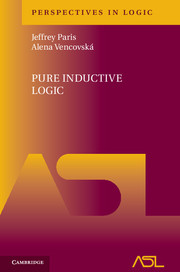Book contents
- Frontmatter
- Contents
- PREFACE
- Part 1 The Basics
- Part 2 Unary Pure Inductive Logic
- Chapter 8 Introduction to Unary Pure Inductive Logic
- Chapter 9 De Finetti's Representation Theorem
- Chapter 10 Regularity and Universal Certainty
- Chapter 11 Relevance
- Chapter 12 Asymptotic Conditional Probabilities
- Chapter 13 The Conditionalization Theorem
- Chapter 14 Atom Exchangeability
- Chapter 15 Reichenbach's Axiom
- Chapter 16 Carnap's Continuum of Inductive Methods
- Chapter 17 Irrelevance
- Chapter 18 Another Continuum of Inductive Methods
- Chapter 19 The NP-Continuum
- Chapter 20 The Weak Irrelevance Principle
- Chapter 21 Equalities and Inequalities
- Chapter 22 Principles of Analogy
- Chapter 23 Unary Symmetry
- Part 3 Polyadic Pure Inductive Logic
- BIBLIOGRAPHY
- Index
- Symbols and Abbreviations
Chapter 23 - Unary Symmetry
from Part 2 - Unary Pure Inductive Logic
Published online by Cambridge University Press: 05 May 2015
- Frontmatter
- Contents
- PREFACE
- Part 1 The Basics
- Part 2 Unary Pure Inductive Logic
- Chapter 8 Introduction to Unary Pure Inductive Logic
- Chapter 9 De Finetti's Representation Theorem
- Chapter 10 Regularity and Universal Certainty
- Chapter 11 Relevance
- Chapter 12 Asymptotic Conditional Probabilities
- Chapter 13 The Conditionalization Theorem
- Chapter 14 Atom Exchangeability
- Chapter 15 Reichenbach's Axiom
- Chapter 16 Carnap's Continuum of Inductive Methods
- Chapter 17 Irrelevance
- Chapter 18 Another Continuum of Inductive Methods
- Chapter 19 The NP-Continuum
- Chapter 20 The Weak Irrelevance Principle
- Chapter 21 Equalities and Inequalities
- Chapter 22 Principles of Analogy
- Chapter 23 Unary Symmetry
- Part 3 Polyadic Pure Inductive Logic
- BIBLIOGRAPHY
- Index
- Symbols and Abbreviations
Summary
The idea that it is rational to respect symmetry when assigning beliefs led us in the previous chapters to formulate the Principles of Constant and Predicate Exchangeability, Strong Negation and Atom Exchangeability. Since these have proved rather fruitful it is natural to ask if there are other symmetries we might similarly exploit, and in turn this begs the question as to what we actually mean by a ‘symmetry’. In this chapter we will suggest an answer to this question, and then consider some of its consequences.
First recall the context in which we are proposing our ‘rational principles of belief assignment’: Namely we imagine an agent inhabiting some world or structure M in TL who is required to assign probabilities w(θ) to the θ ∈ SL in an arguably rational way despite knowing nothing about which particular structure M from TL s/he is inhabiting. Given this framework it seems (to us at least) clear that the agent should act the same in this framework as s/he would in any isomorphic copy of it, on the grounds that with zero knowledge the agent should have no way of differentiating between his/her framework and this isomorphic copy.
To make sense of this idea we need an appropriate formulation of an ‘automorphism’ of the framework. Arguing that all the agent knows is L, TL and for each θ ∈ SL the conditions under which θ holds, equivalently the set of structures in TL in which θ is true, suggests that what we mean by an ‘automorphism’ is an automorphism σ of the two sorted structure BL with universe TL together with all the subsets of TL of the form
[θ] = {M ∈ TL|M ⊧ θ}
for θ ∈ SL, and the binary relation ∈ between elements of TL and the sets [θ].
- Type
- Chapter
- Information
- Pure Inductive Logic , pp. 171 - 178Publisher: Cambridge University PressPrint publication year: 2015



